This vegan pasta primavera is lemony and creamy, yet light. It’s a perfect celebration of fresh, green spring produce, and it can be adapted for other seasons of the year, too.
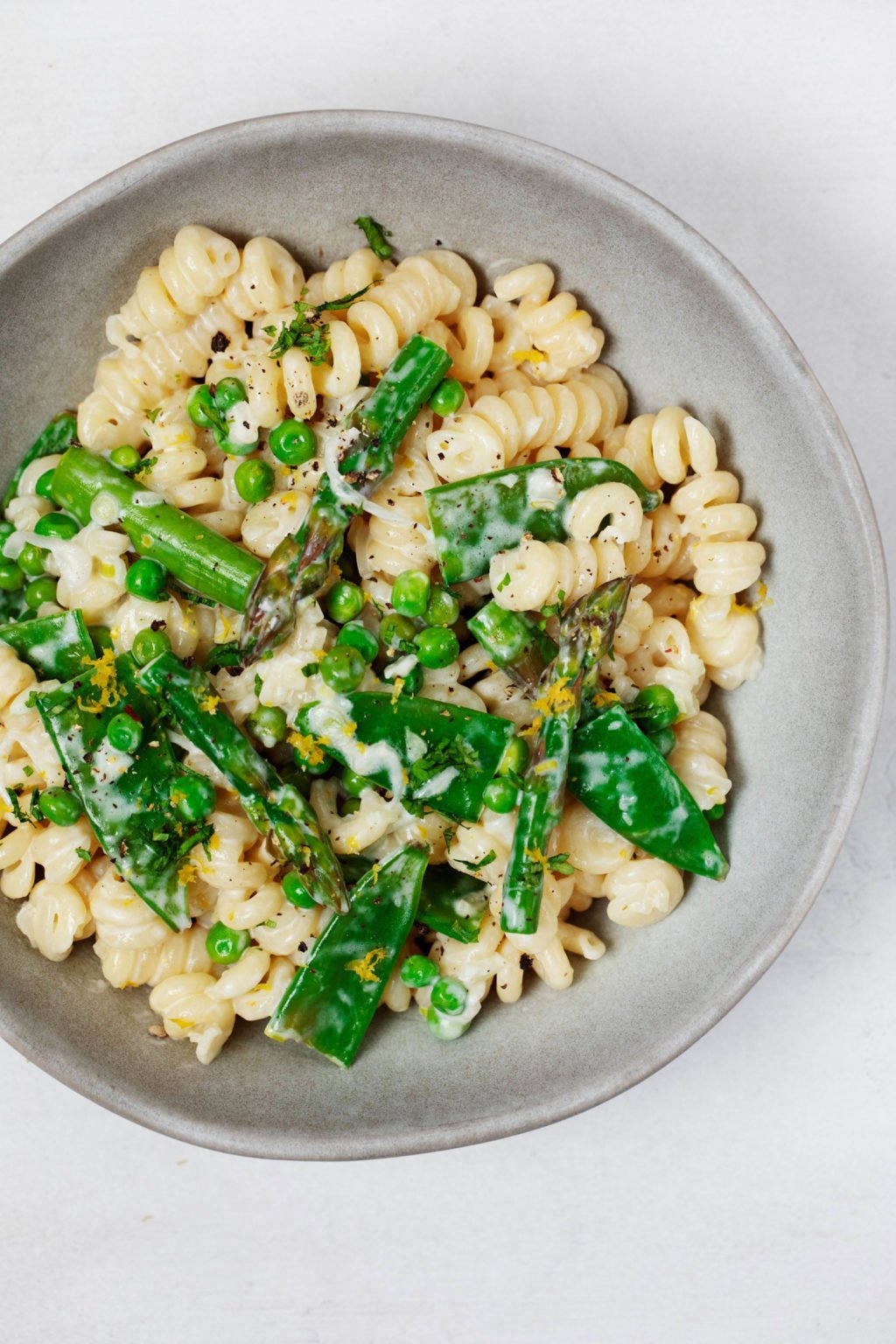
It has been blustery and brisk this week. It’s also that time of year when the heat stops coming up in the morning in my apartment in spite of the fact that it’s 40 degrees in the morning.
Springtime in New York City can be a chilly season. All the more reason for bright, springtime recipes in my kitchen—meals that promise warmer days ahead.
This lovely, springtime vegan pasta primavera is one of those. I made it a couple weeks ago, after a month or two of having little energy to cook more than staples.
It was my first time this year having fresh asparagus and sugar snap peas, and it was delightful.
I’ve made the pasta again since then, and I’m sure that it will become an April favorite for me. It’s so easy to make, and its simplicity is totally appropriate. Because it has only few ingredients, the fresh, crispy produce and hint of lemon zest shine.
This vegan pasta primavera features a light cream sauce. That sauce is achieved by using either vegan sour cream (homemade or store-bought), or my all-purpose cashew cream.
The effect is a pasta that’s just a little creamy and luxurious, but not as heavy as carbonara or alfredo—a perfect in-between for an in-between season.
What is pasta primavera?
Pasta primavera is an American pasta dish that originated in the 1970s. It’s attributed to chefs at Le Cirque restaurant in NYC. It’s made with vegetables and pasta, along with butter, cream, or both.
Pasta primavera recipes vary significantly. I’ve seen the dish made with green vegetables and spring produce, much like the recipe that I’m sharing today.
I’ve also seen pasta primavera recipes that call for broccoli, peppers, fresh tomatoes, carrots, red onion, zucchini, and more. This is an adaptable dish, one that can be made with vegetables that are available and in season.
How to make vegan pasta primavera
My recipe was inspired by two others: Melissa Clark’s pasta primavera with asparagus and peas, which is made with Greek yogurt, and J. Kenji López-Alt’s version with crème fraîche.
There isn’t much to veganizing this dish—really, the only task is to re-create the creamy component of pasta primavera without dairy.
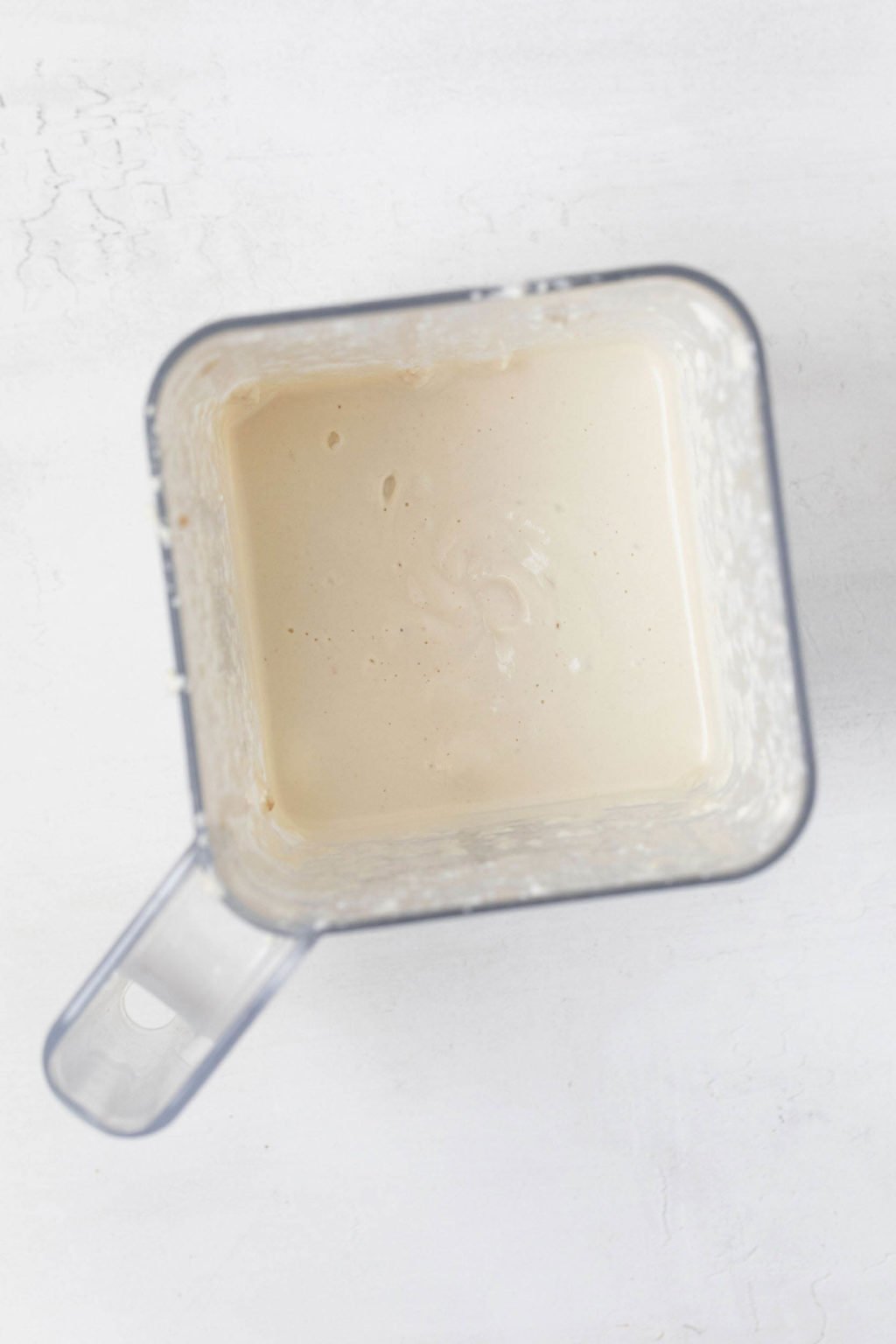
The first option is to use the vegan sour cream that I posted last week. That sour cream is similar to crème fraîche, and it works beautifully in this light, fresh, springtime pasta dish.
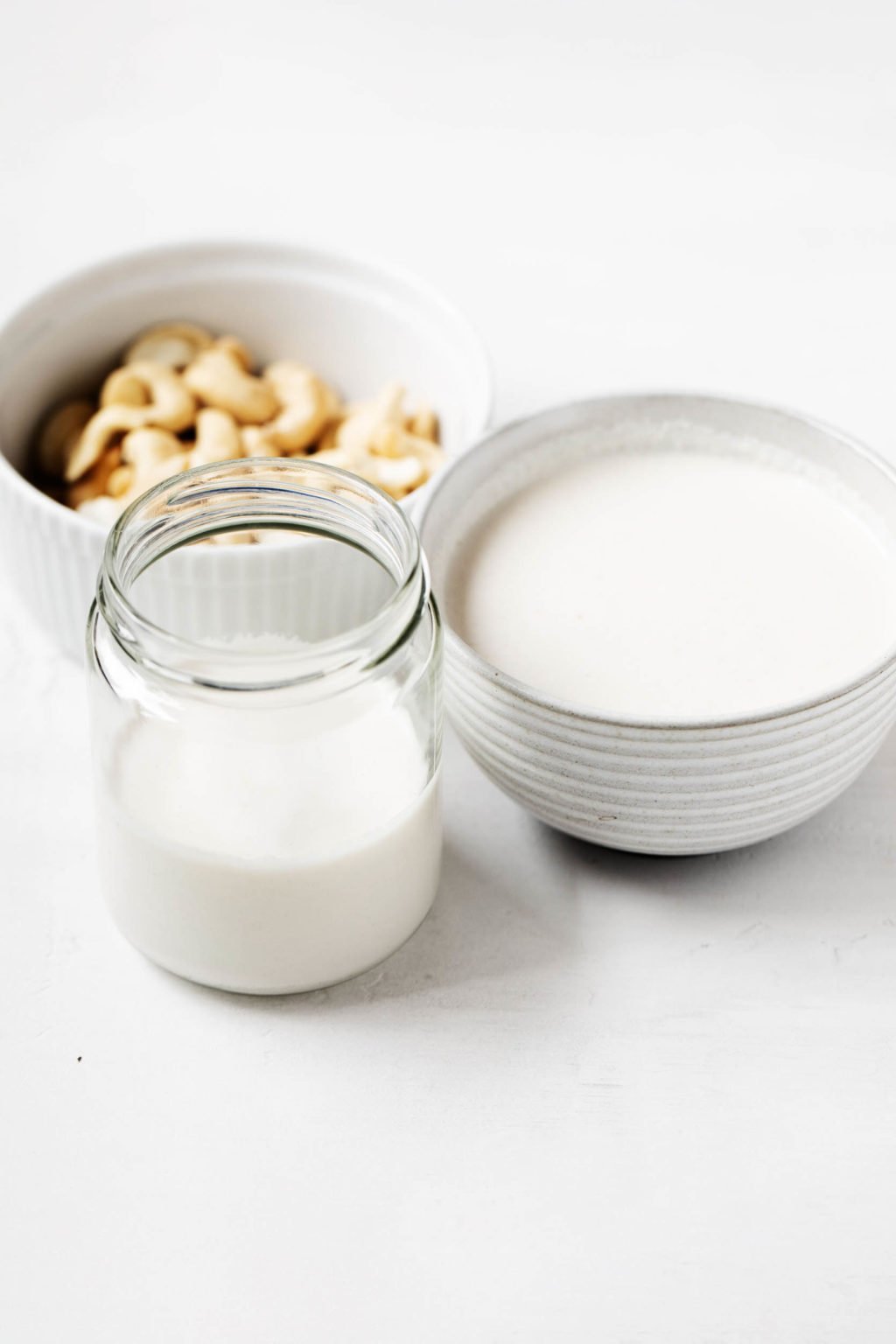
The other option would be to use my all-purpose cashew cream, which (longtime readers know) I use in just about everything, from pasta dishes to scones and pie.
These two components are made in the same way: by blending soaked cashews and water in a high-speed blender or a food processor.
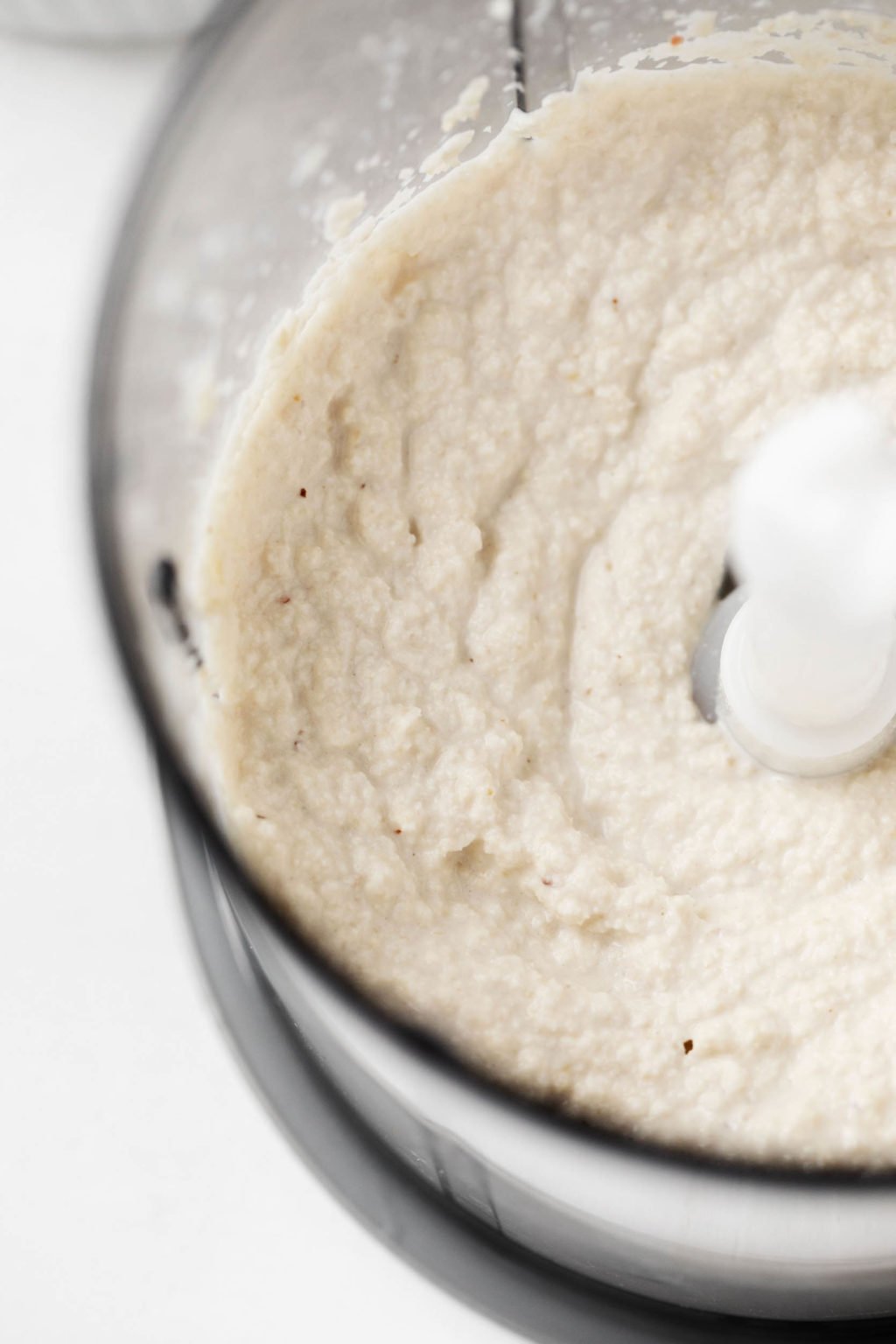
The recipes each give instructions for blending, soaking cashews, which cashews to choose, and more.
If you make the creamy component in advance, actually whipping up the pasta primavera is incredibly simple.
You’ll start by steaming your spring vegetables until they’re crisp-tender. Then, you’ll boil your pasta, reserving some cooking water to help bring the dish together at the end.
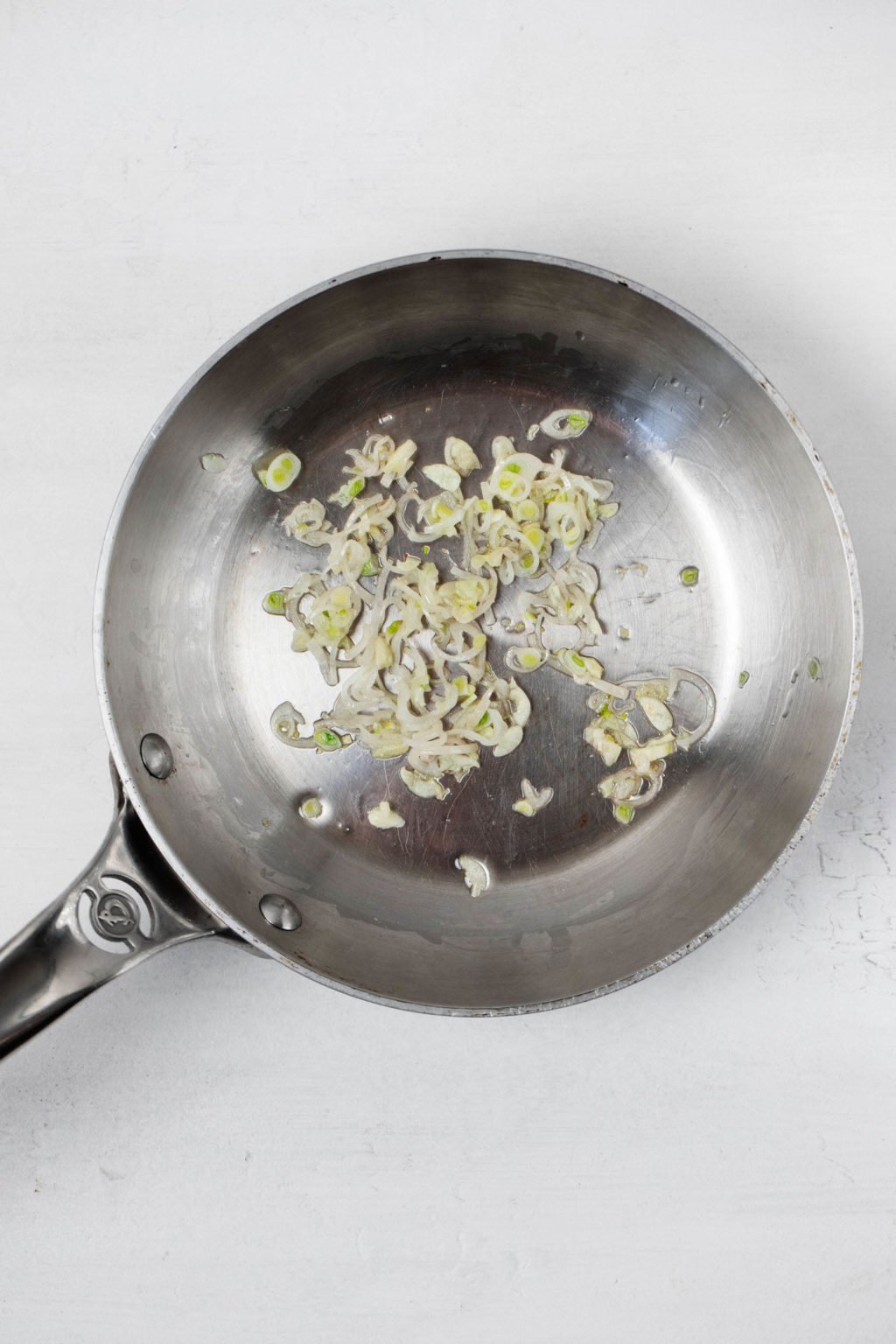
Next, you’ll sauté some shallots and garlic. At this point, you’ll add your cooked pasta, followed by the cashew cream, some cooking water, lemon zest and juice, and salt and pepper. As you stir everything together, a light cream sauce will envelop the pasta.
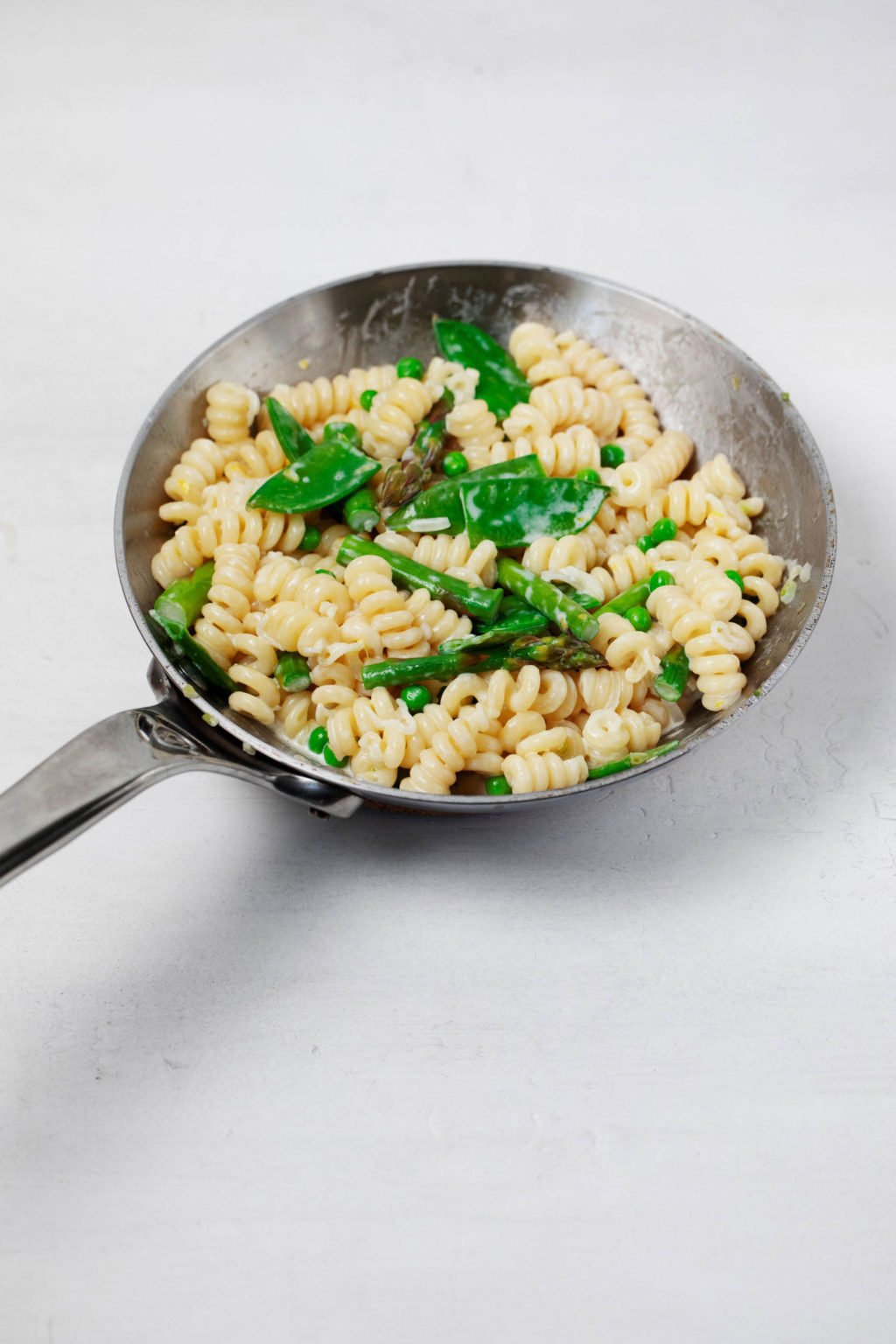
You’ll finish the recipe by folding your vegetables in. Garnish with cashew parmesan and/or fresh herbs, and you’re ready to eat.
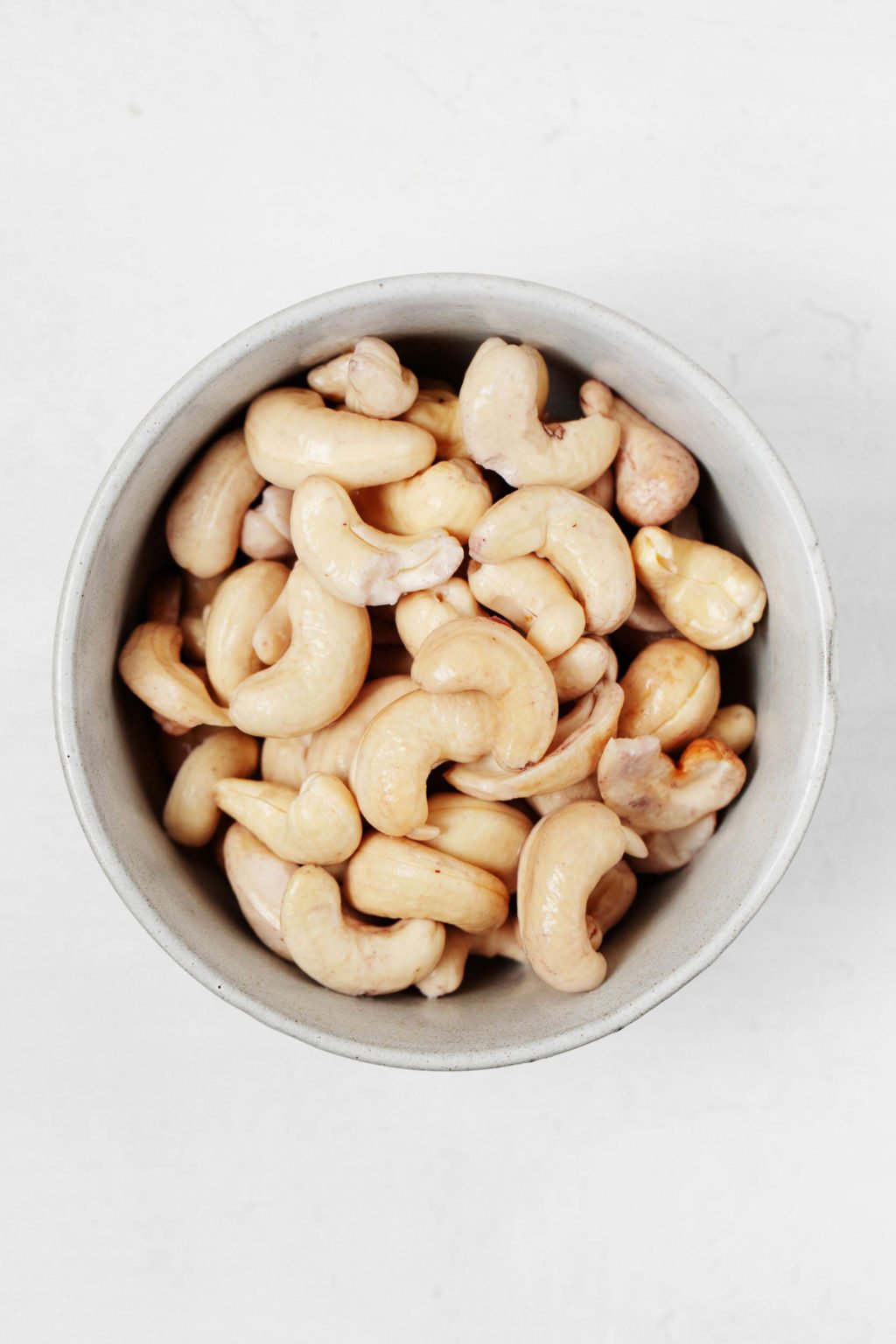
Cashew cream substitutions
What if you don’t have either a food processor or a high-speed blender? Or you do have a cashew allergy?
That’s OK. I’ve experimented with a number of cashew cream substitutions, and I’ve landed on three that work well.
For each cup of cashew cream (or cashew sour cream) that’s called for in a recipe, substitute:
- 1/2 cup / 120g vegan cream cheese (nut-based or tofu-based) blended with 1/2 cup / 120ml water
- 1 cup / 220g silken tofu, blended till smooth
- 1 cup / 240ml unsweetened plain coconut yogurt
These options will work for this vegan pasta primavera, if cashews aren’t for you.
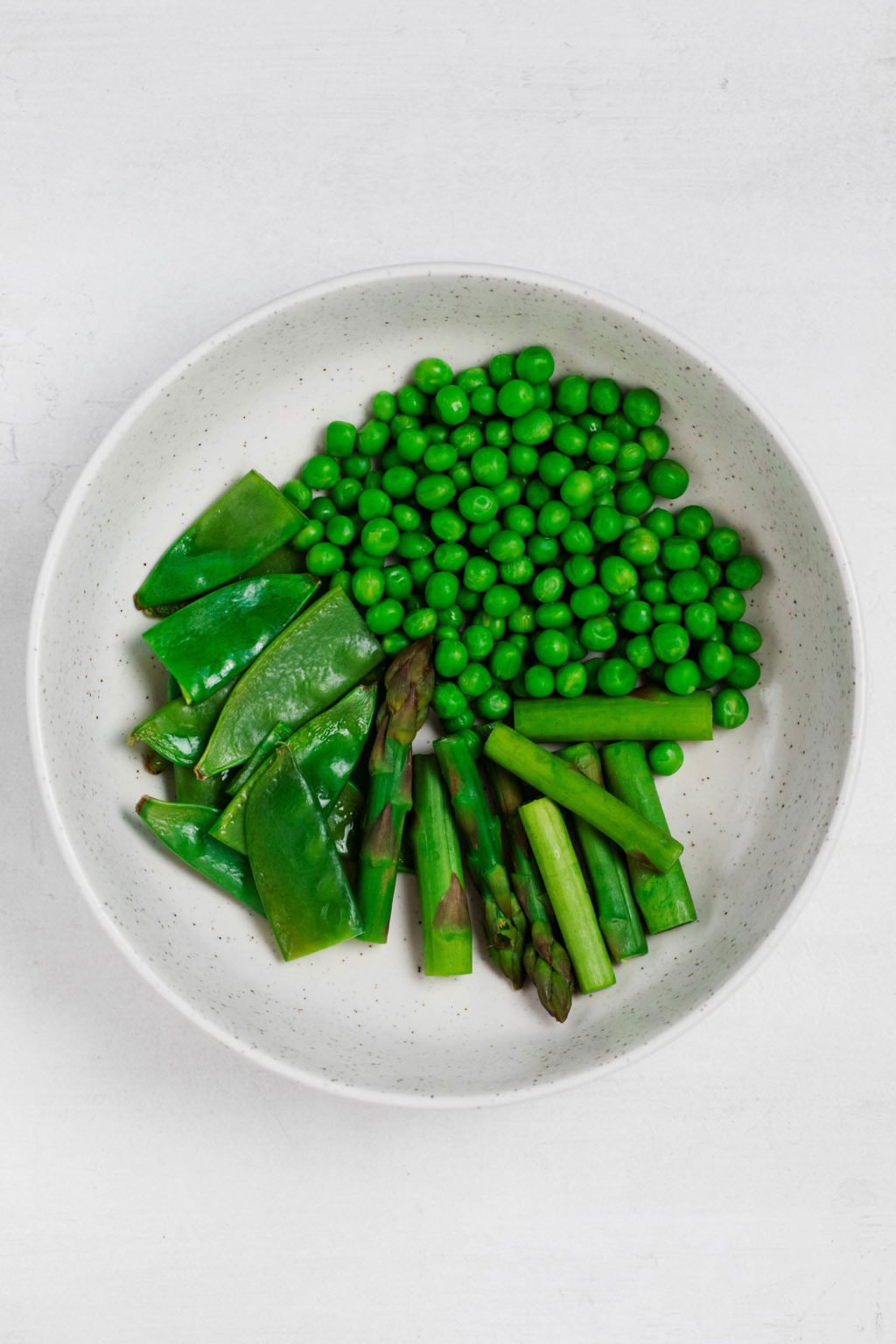
Spring pasta primavera ingredients
One of the things that I love about this dish is the relatively simple ingredient list. Here are the highlights.
Vegetables
My intention here was to take advantage of fresh, spring produce, and I chose my favorites: asparagus, sugar snap peas, and green peas.
You can celebrate the season with me, if the same vegetables are available near you. However, you can also modify the pasta dish to include the vegetables that you have at home. Here are some that you might like to try:
- Thinly sliced bell pepper strips
- Broccoli florets
- Cauliflower florets
- Chopped spinach, kale, broccoli rabe, or Swiss chard
- Thinly sliced zucchini or summer squash half moons
- Pearl onions
- Cherry tomatoes
- Thinly sliced red onion
- Julienned carrots
Pasta
90% of the time, I use regular old pasta to make my pasta suppers.
The remaining 10% of the time I use whole wheat pasta, or I reach for bean/lentil pasta. Legume-based pasta isn’t my favorite from a taste/texture perspective, but I do like its plant protein content.
You can use your pasta of choice in the vegan pasta primavera. Regular, whole grain, legume, gluten-free: it’s up to you.
4-ingredient vegan sour cream
As I mentioned, you can use vegan sour cream, regular cashew cream, or one of my suggested substitutes.
Lemon zest
“The lemon zest is everything,” said a friend who tasted this recipe, and it’s true. Because the ingredient list is so simple, this pop of flavor goes a long way. This definitely isn’t an ingredient to skip!
Finishing touches
Keeping in the theme of simplicity, your final garnishes on the pasta primavera can make a big difference. They provide a final, vibrant pop of flavor.
My favorite finishing touches? Fresh, chopped herbs (I like parsley), an extra bit of lemon zest, or cashew parmesan cheese.
You can use my favorite, homemade cashew parmesan cheese, or you can use a store-bought vegan parm.
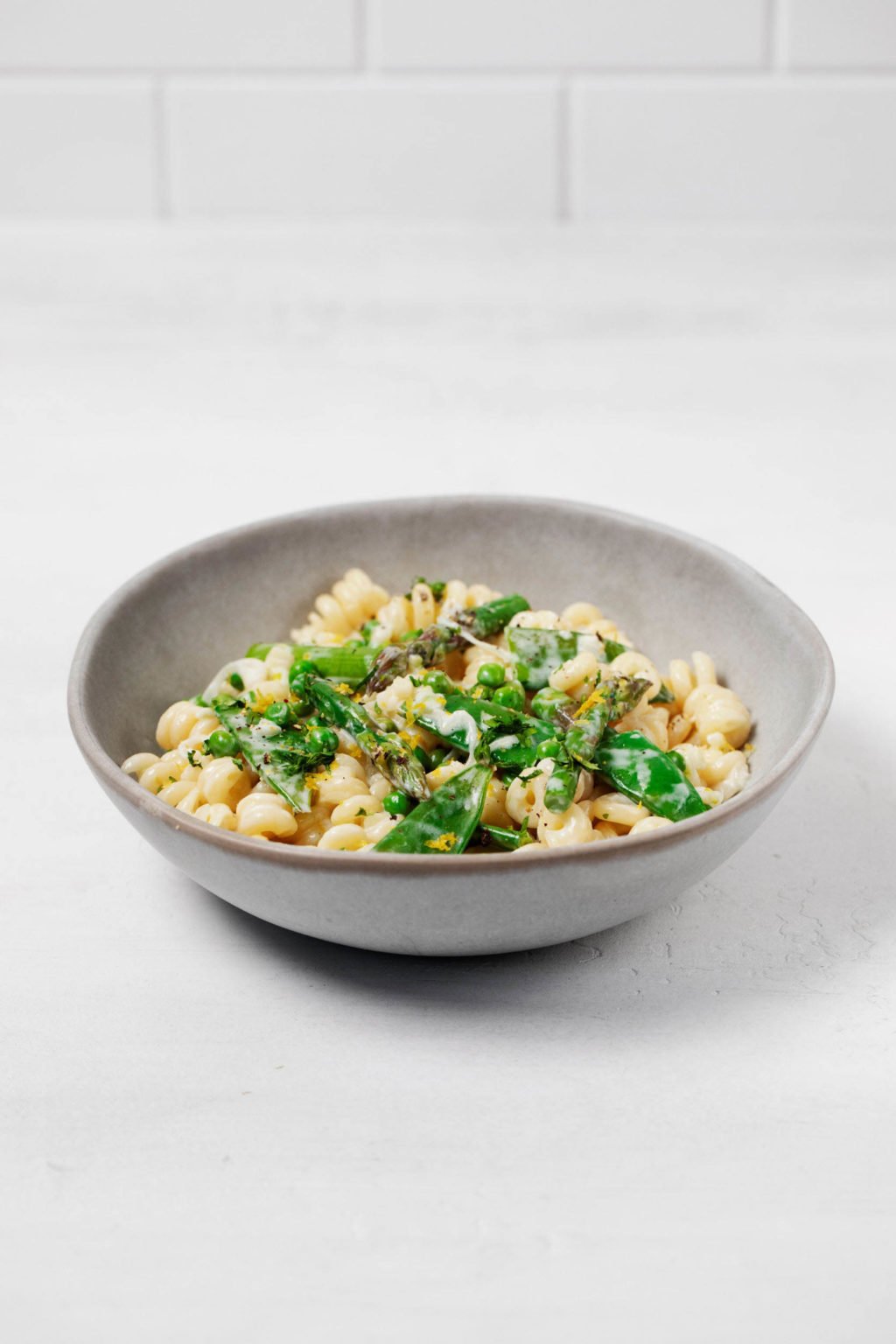
Meal prep & storage
I think that the pasta primavera is a dish best whipped up right before eating. However, the pasta keeps nicely for up to three days. Store them in an airtight container in the fridge.
If you’d like to get a head start on the recipe, the best meal prep option is to make your cashew sour cream or all-purpose cream a day or two in advance.
In addition, it’s easy to freeze cashew cream. I freeze mine all the time; in fact, I often make double batches specifically to have extra in the freezer. Cashew cream can be frozen for up to 6 weeks.
Can I freeze the pasta primavera?
In spite of how nice it is to enjoy this dish right after it’s folded together, you won’t want to let any left over portions go to waste!
You can freeze the pasta primavera for up to four weeks, defrosting it in the fridge overnight before serving.
Celebrating spring
I love putting celebrating the bright green colors and fresh flavors of spring in my dishes. Here are a few other seasonal favorites:
- Green goddess spring socca
- Lemon orzo pasta salad
- Lentil beet salad
- Vegan, gluten-free mac n’ cheese with peas
- Green pea hummus tartine
- Balsamic tofu quinoa strawberry salad
- French lentil Niçoise salad
- Savory spring oats with tofu, spinach, and peas
- Tofu udon noodle salad with spring vegetables
- Barley asparagus mushroom risotto
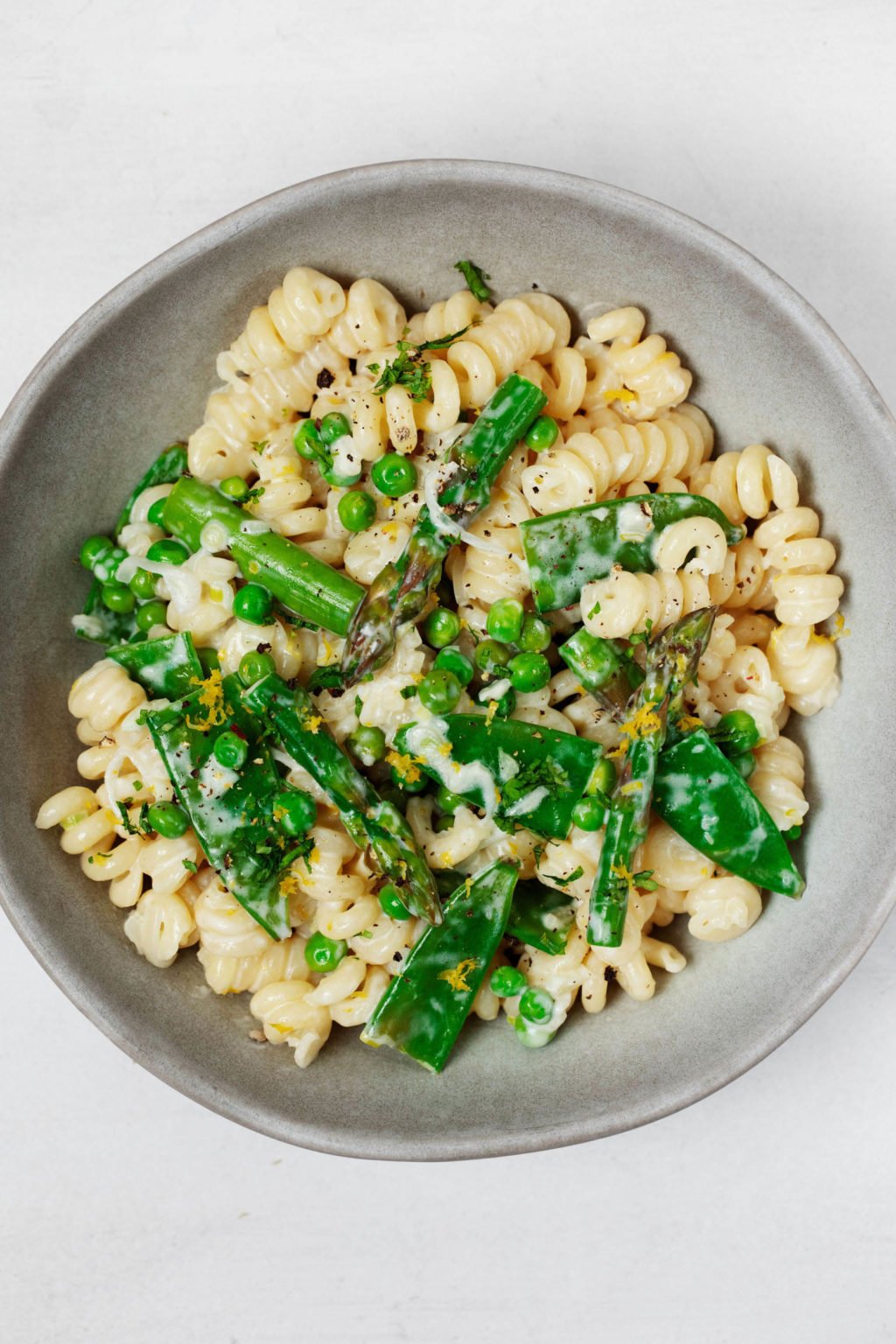
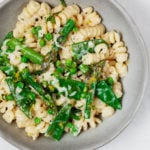
Vegan Spring Pasta Primavera
Ingredients
- 8 ounces asparagus, bottom ends trimmed and cut into 2-inch pieces (225g)
- 8 ounces stringless sugar snap peas, halved crosswise (225g)
- 3/4 cup fresh or frozen and thawed green peas (100g)
- 8 ounces pasta of choice (225g)
- 2 tablespoons olive oil
- 3 shallots, halved lengthwise and thinly sliced
- 2 cloves garlic, minced
- 6 tablespoons cooking water (90mL; reserve 3/4 cup/180mL in case you need more)
- 4-6 tablespoons cashew sour cream or all-purpose cashew cream (60-90mL)
- 1 tablespoon lemon zest (more as desired, for garnish)
- 1 1/2 tablespoons freshly squeezed lemon juice
- 1/2 teaspoon fine sea salt, plus extra for pasta water
- Freshly ground black pepper to taste
- Chopped fresh herbs, lemon zest, and/or cashew parmesan cheese, for serving
Instructions
-
Fill a large pot with a few inches of water and fit it with a steamer basket. Bring the water to a boil, then lower it to a simmer. Place the asparagus in the basket and steam for 3-4 minutes, or until bright green and tender. Remove the asparagus from the basket and transfer it to a colander or bowl for holding. Add the sugar snap peas to the steamer basket. Steam the snap peas for 2 minutes, or until bright green and crisp tender. Remove the peas and add them to the colander with the asparagus. Finally, add the peas to the steamer basket. Steam for 1-2 minutes, or until the peas are bright green and tender, then transfer them to the colander or bowl with the other vegetables. Set the vegetables aside.
-
Fill the pot with enough additional water to boil pasta. Salt the water and bring it to a boil. Add the pasta and cook according to package instructions, or until cooked through but still slightly al dente (or to your liking). Drain the pasta, reserving 3/4 cup of the cooking water.
-
In the meantime, heat the olive oil on medium low heat in a large, deep skillet. Add the shallots. Cook for 1 1/2-2 minutes, stirring constantly, or until the shallots are clear and tender. Add the garlic. Cook for another minute, stirring constantly, or until the garlic is very fragrant. Add the the pasta to the skillet, along with 6 tablespoons of the pasta cooking water. Add 4 tablespoons of cashew sour cream or all-purpose cashew cream, lemon zest, lemon juice, and salt to the skillet and stir to coat the pasta well.
-
Add the steamed vegetables. Fold everything together gently, heating the ingredients as you go. Add an additional couple tablespoons of the cooking water or cashew cream to loosen the pasta as needed; you’re aiming for a creamy, yet light, sauce. Add freshly ground pepper and additional salt or lemon juice as needed.
-
Serve the pasta right away, garnished with fresh chopped herbs or cashew parmesan, or store for up to 4 days in an airtight container in the fridge. The pasta can also be frozen for up to 4 weeks.
Notes
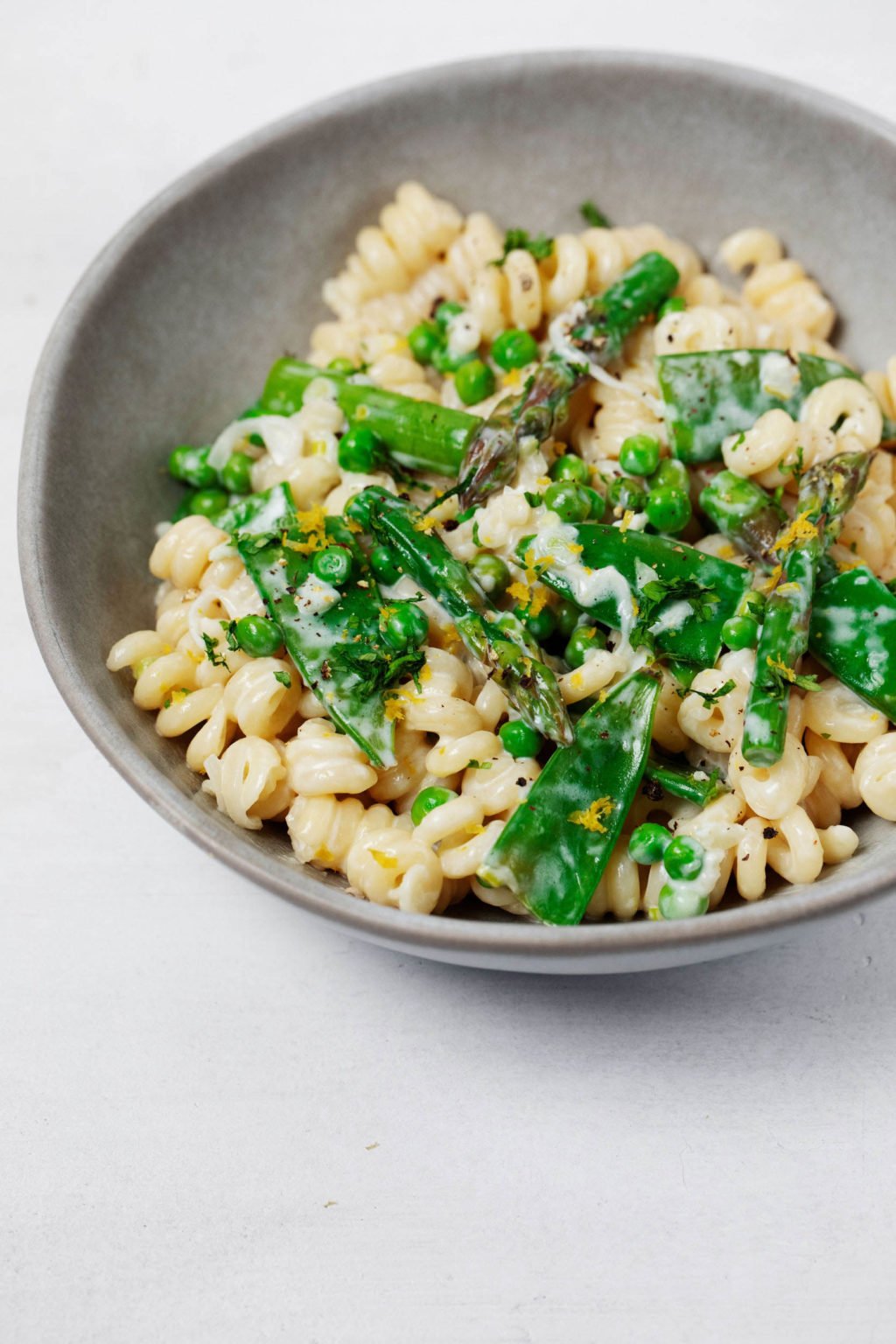
I find it tough to cook these days unless I make things ahead of time, over the weekend. But one of the nice things about the pasta primavera is that it truly is a weeknight-friendly dish.
I’m hoping that you’ll have the time to enjoy it soon, on a springtime evening, maybe as you savor the lingering sunlight of lengthening days.
Till soon,
xo
The post Spring Vegan Pasta Primavera appeared first on The Full Helping.

0 comments